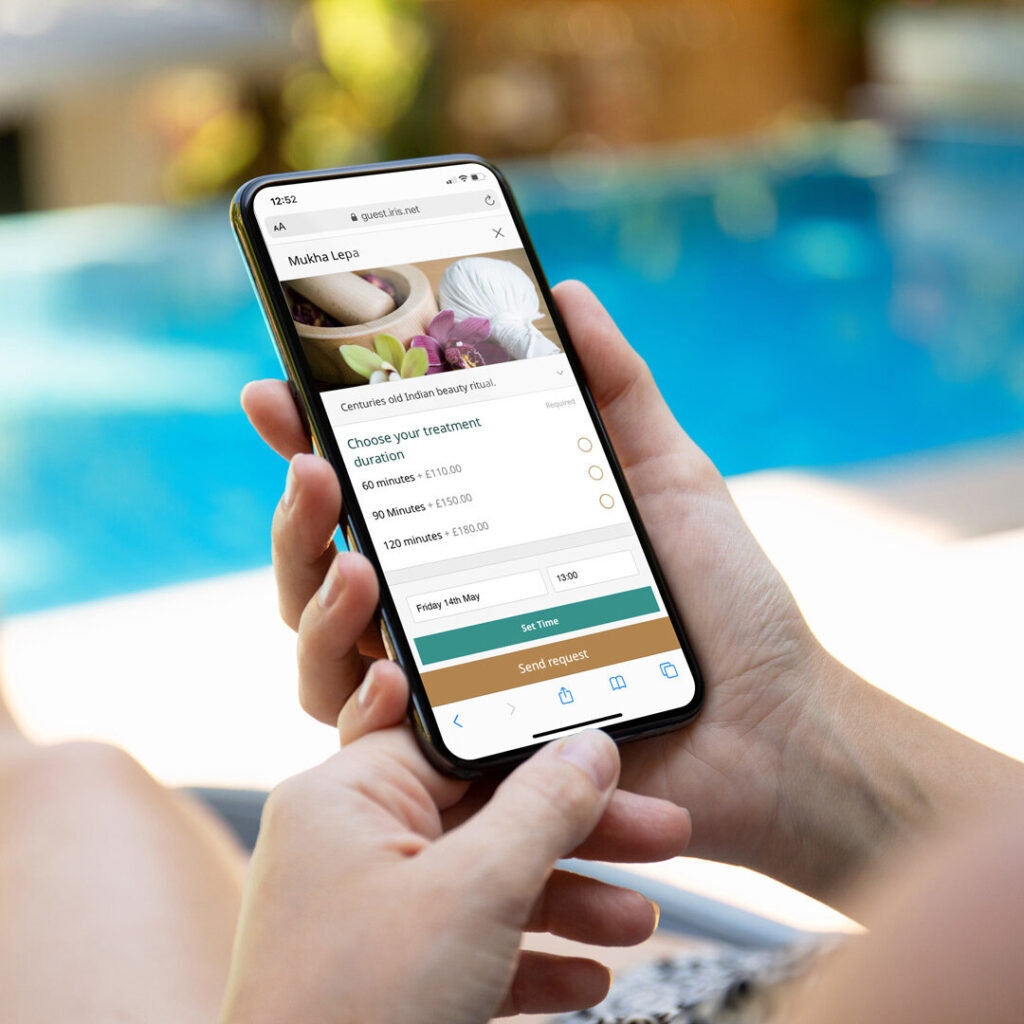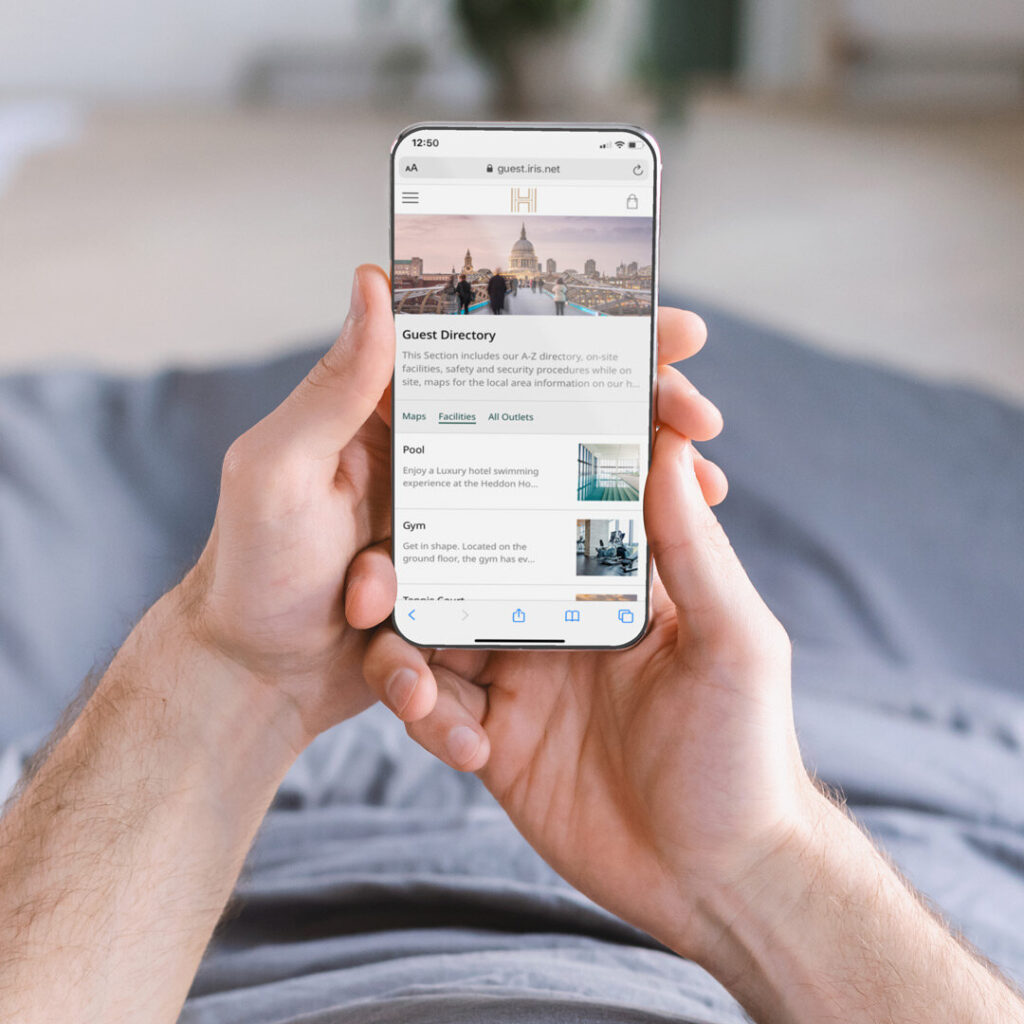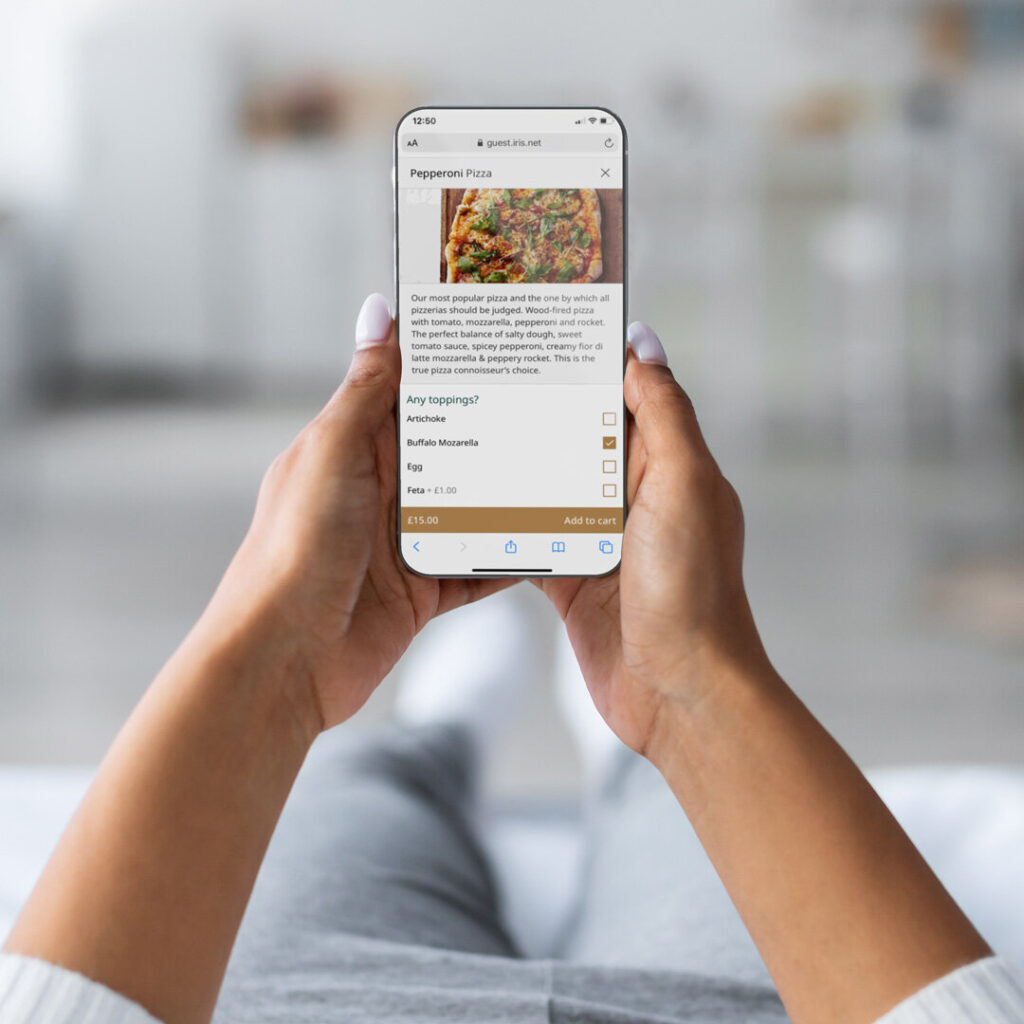
By David Molofsky, Product Manager at IRIS Software Systems - 1.20.2023
Against the backdrop of continued challenges presented by staffing and rising inflation, one of the reassuring constants has been the development and adoption of mobile tech which supports operations, adds value to the guest experience and accelerates profits.
Taking a closer look at the hospitality tech stack mix, mobile ordering has firmly proved its value and capability as guests and operators alike have continued to adopt it frequently. It’s been a mainstay of F&B operations, however the landscape looks set for even greater shifts in 2023.
Here are some key mobile ordering trends that will pay dividends for hoteliers this year:
Guest directory and service requests take the mobile ordering centre stage
Both guests and operators have been reassured by the functionality of F&B mobile ordering, and this level of confidence will no doubt trigger strong growth in the domains of both guest directory and service requests going forward.
 Taking the guest directory first, improving the guest experience is the guiding principle, and this looks set for significant growth as it continues to enhance a guest’s stay. Information on local attractions and hotel amenities is leading the charge as guests want to make the most of their time away, whether that be a visit to a local museum, a spa booking or adventure excursions. Indeed experience-led travel has characterized much of the pent-up demand in bookings throughout the course of 2022.
Taking the guest directory first, improving the guest experience is the guiding principle, and this looks set for significant growth as it continues to enhance a guest’s stay. Information on local attractions and hotel amenities is leading the charge as guests want to make the most of their time away, whether that be a visit to a local museum, a spa booking or adventure excursions. Indeed experience-led travel has characterized much of the pent-up demand in bookings throughout the course of 2022.
Putting details of local attractions as well as property attractions in the palm of a guest’s hand is an efficient way to both advertise as well as drive additional revenues. Not only do guests actively want to manage this part of their stay themselves, but it also shifts the burden from members of staff who can be available to offer advice; but when it comes to researching and actually confirming a booking, reassuringly, guests are more and more willing to do so online, at a time and location that suits them and their itinerary.
As this demand grows, so too will the capabilities and volume of information available, from loyalty programs, kid’s clubs and yoga classes to one-off local exhibitions and festivals. New mobile features will enable properties to align accommodation with out-of-room experiences, giving guests a more personalized experience whilst at the same time providing hotels with the opportunities to drive valuable incremental revenue.
 Running alongside the guest directory, we also expect guest service and housekeeping requests will follow suit as guests take on a more autonomous approach to requests for things like additional pillows or new towels. By managing the process online, the requests are handled more efficiently by the hotel staff, the guest’s request is fulfilled quicker, and there is less reliance on the front desk to man phones and ensure calls are answered.
Running alongside the guest directory, we also expect guest service and housekeeping requests will follow suit as guests take on a more autonomous approach to requests for things like additional pillows or new towels. By managing the process online, the requests are handled more efficiently by the hotel staff, the guest’s request is fulfilled quicker, and there is less reliance on the front desk to man phones and ensure calls are answered.
Crucially in building these capabilities, all information and requests are accessible via a QR code that is readily available across the property and can also be updated at the touch of a button, ensuring it’s always up to date and accurate to provide a more sustainable and cost-effective approach to managing information for both hoteliers and guests.
Advanced Ordering
Whether a trip away is for leisure or to focus on business, ordering F&B in advance is one effective way guests can free up their time and enhance their stay. Everything from chilled Champagne on arrival in the honeymoon suite to groceries to your holiday villa or catering for events can be managed through an advanced ordering system. Not only does this ease the pressure on staff by providing advance time to plan (which makes it easier to fulfil the orders), but it can also be supplemented by pre-pay to support cash flow.
And it’s all prepped and ready for when the guests arrive, what a wonderful start to their holiday with you. A win-win for guests and operators.
F&B features get personal for hotel guests
 One item topping the menu agenda in 2022 was calorie information which is now mandatory in the UK for larger restaurants. Whether or not this lasts remains to be seen, but the trend for more information and filters available to guests to meet their dietary requirements is certainly here to stay.
One item topping the menu agenda in 2022 was calorie information which is now mandatory in the UK for larger restaurants. Whether or not this lasts remains to be seen, but the trend for more information and filters available to guests to meet their dietary requirements is certainly here to stay.
Whilst this has been more typical of the restaurant guest journey, we fully expect more hotel operators to adopt a more sophisticated approach to their dietary requirement search and request service offers via their own F&B mobile ordering apps. Guests will be able to enter their own requirements (gluten-free or vegetarian, for example) to then receive a tailored menu option that is suitable for them. The result? A better guest experience and greater guest knowledge to support future sales and marketing strategies.
Discounts
Rising inflation will inevitably lead to an even sharper focus on price from guests as we start the new year. Working hand in hand with this will be demand for the offering, promoting, and availing of discounts. The concept of discounts in hospitality is certainly not new. Many hotel groups offer discounts to airline staff, for example, to enjoy 20% off room rates and complimentary breakfast. Moving into 2023, the overall trend across hospitality operations will be the push for digital services and functionality.
So how will discounts feature within this elevated digital ecosystem? The answer lies in taking a holistic approach so that any discount that is in place is fully integrated and functional with other platforms and apps. Once a discount is ‘built’ it can be utilized and offered in several different ways. For example, free coffee can be applied to segmented markets or event / MICE bookings, whilst discount packages can also be built for wedding bookings and made available to wedding guests to make them feel valued and part of an enhanced guest journey.
Call wait staff
Sadly, the onerous experience of being placed on hold whilst waiting to speak to a human being is an all too common experience for any customer. Likewise, trying to flag down a waiter in a busy restaurant or bar. To tackle this and the concurrent staffing challenge will be the marked shift towards contacting staff digitally, which we also expect will see a big uplift next year and beyond.
For any guest requiring in-person assistance during their stay or meal, the call waitstaff function via the app can generate a ticket to the team to request assistance and eliminate the need to try and flag down a member of staff. This reduces the number of staff needed to walk the floor, allowing for a more efficient distribution of resources. Staff can go where there is a genuine need for assistance, resulting in happier guests benefitting from more attentive service.
Which of these trends will grow the fastest remains to be seen, but as a sum of the mobile ordering parts, it will be interesting to witness how they emerge across regions and market segments as guests seek to take advantage of a more enjoyable, efficient, and sustainable stay and hoteliers reap the benefits of improved revenue, cost savings and more efficient use of resources.
 David Molofsky is Product Manager at IRIS Software Systems, a global market leader in digital F&B ordering, guest directory and concierge solutions for hotels, working with many of the world’s leading chains including Marriott, Hilton, Mandarin Oriental, IHG and Four Seasons. Its flexible hospitality platform enables hotels and restaurants to provide a truly digital ordering experience to their guests, making it easier and faster for guests to browse, order and pay for items and services across multiple outlets. Since 2010, thousands of hotels on every continent across the world have used IRIS’s mobile, tablet and web app technology to boost additional revenues by 20% on average. David is a Certified Scrum Product Owner with over 10 years of experience working with digital products. He joined IRIS in September 2021 as Product Manager, overseeing the conception and design of new product features and setting the priorities for the development team. Outside of work, David is the Editor-in-Cape of the superhero and comic review site ‘A Place To Hang Your Cape’ and you can often find him with his nose in a comic book.
David Molofsky is Product Manager at IRIS Software Systems, a global market leader in digital F&B ordering, guest directory and concierge solutions for hotels, working with many of the world’s leading chains including Marriott, Hilton, Mandarin Oriental, IHG and Four Seasons. Its flexible hospitality platform enables hotels and restaurants to provide a truly digital ordering experience to their guests, making it easier and faster for guests to browse, order and pay for items and services across multiple outlets. Since 2010, thousands of hotels on every continent across the world have used IRIS’s mobile, tablet and web app technology to boost additional revenues by 20% on average. David is a Certified Scrum Product Owner with over 10 years of experience working with digital products. He joined IRIS in September 2021 as Product Manager, overseeing the conception and design of new product features and setting the priorities for the development team. Outside of work, David is the Editor-in-Cape of the superhero and comic review site ‘A Place To Hang Your Cape’ and you can often find him with his nose in a comic book.
Are you an industry thought leader with a point of view on hotel technology that you would like to share with our readers? If so, we invite you to review our editorial guidelines and submit your article for publishing consideration.
